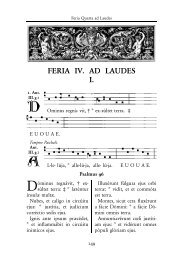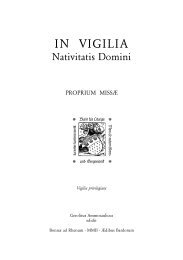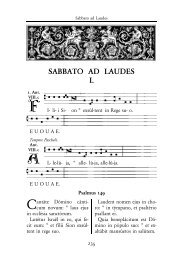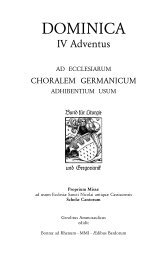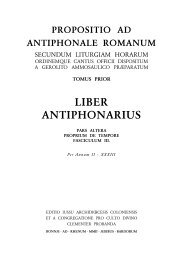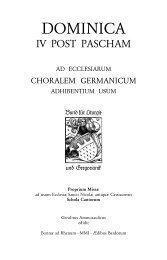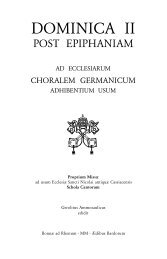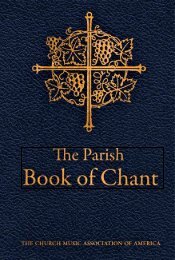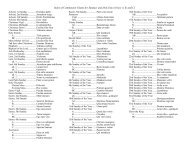The Bugnini-Liturgy and the Reform of the Reform - MusicaSacra
The Bugnini-Liturgy and the Reform of the Reform - MusicaSacra
The Bugnini-Liturgy and the Reform of the Reform - MusicaSacra
Create successful ePaper yourself
Turn your PDF publications into a flip-book with our unique Google optimized e-Paper software.
form.) <strong>The</strong> restauration <strong>of</strong> <strong>the</strong> Litany Kyrie Puerorum was, <strong>of</strong> course, out<br />
<strong>of</strong> <strong>the</strong> question, in spite <strong>of</strong> <strong>the</strong> fact that it could be easily identified with <strong>the</strong><br />
darling <strong>of</strong> <strong>the</strong> <strong>Bugnini</strong> liturgy, <strong>the</strong> Preces.<br />
In <strong>the</strong> <strong>Bugnini</strong> liturgy in <strong>the</strong> place <strong>of</strong> <strong>the</strong> Officium Tenebrarum we can<br />
find a meticulously elaborated, ordinary daily Office. Some antiphons <strong>and</strong><br />
responsories selected from <strong>the</strong> Roman rite appear here <strong>and</strong> <strong>the</strong>re, yet <strong>the</strong><br />
Office itself — preserved thus far in every tradition as <strong>the</strong> fundamental heritage<br />
<strong>of</strong> <strong>the</strong> Roman liturgy - was eliminated after a life <strong>of</strong> at least 1500 years.<br />
5.<br />
<strong>The</strong> "<strong>the</strong>me" <strong>of</strong> <strong>the</strong> liturgy on MAUNDAY THURSDAY is not <strong>the</strong> institution<br />
<strong>of</strong> <strong>the</strong> Eucharist but <strong>the</strong> whole Paschal Mystery, similarly to Good Friday or<br />
Easter Sunday. <strong>The</strong> classics <strong>of</strong> liturgical doctrine explained repeatedly that<br />
during <strong>the</strong>se holy days our Passover celebration always recalled <strong>the</strong> memory<br />
<strong>of</strong> Christ's Paschal mystery in its integrity. On a given day some aspects may<br />
gain prevalence above <strong>the</strong> o<strong>the</strong>rs but always as part <strong>of</strong> <strong>the</strong> whole, in close<br />
connection with it. Even when viewed separately, <strong>the</strong> specific content <strong>of</strong><br />
Maundy Thursday can be regarded as multi-layered combining various elements<br />
<strong>of</strong> <strong>the</strong> Last Supper, <strong>the</strong> Lord's Last Sermon, his apprehension <strong>and</strong><br />
interrogation (chronologically <strong>the</strong> first events <strong>of</strong> his Passion). <strong>The</strong> feelings<br />
vibrating in <strong>the</strong> soul <strong>of</strong> <strong>the</strong> Church correspond to <strong>the</strong> two sayings <strong>of</strong> <strong>the</strong><br />
Lord: "With desire I have desired..." - <strong>and</strong> "Fa<strong>the</strong>r, if you will..." <strong>The</strong> reason<br />
why in <strong>the</strong> Middle Ages <strong>the</strong> Church felt <strong>the</strong> need to create <strong>the</strong> Feast <strong>of</strong><br />
Corpus Domini is because she realized that Maundy Thursday was not <strong>the</strong><br />
feast <strong>of</strong> <strong>the</strong> institution <strong>of</strong> <strong>the</strong> Eucharist. Maundy Thursday is a day <strong>of</strong> <strong>the</strong><br />
celebration <strong>of</strong> <strong>the</strong> Paschal Mystery, a day <strong>of</strong> <strong>the</strong> celebration <strong>of</strong> <strong>the</strong> Passion,<br />
a day <strong>of</strong> presenting <strong>the</strong> Redemption through mysteries — <strong>and</strong> in this context<br />
<strong>and</strong> among o<strong>the</strong>r motives only — <strong>the</strong> remembrance <strong>of</strong> <strong>the</strong> institution <strong>of</strong> <strong>the</strong><br />
Eucharist.<br />
This complexity manifests itself within <strong>the</strong> Mass, too. <strong>The</strong> Introit (Nos<br />
autem gloriari), <strong>the</strong> Gradual {Christus factus est) <strong>and</strong> <strong>the</strong> Offertory (Dextern Domini)<br />
refer to <strong>the</strong> fundamental element <strong>of</strong> <strong>the</strong> celebration, i.e. <strong>the</strong> whole Paschal<br />
Mystery. <strong>The</strong> Gospel recalls <strong>the</strong> washing <strong>of</strong> <strong>the</strong> disciples' feet, <strong>the</strong> original<br />
oration puts <strong>the</strong> motive <strong>of</strong> Judas's betrayal into <strong>the</strong> context <strong>of</strong> <strong>the</strong> Holy<br />
Week as a whole.<br />
30



